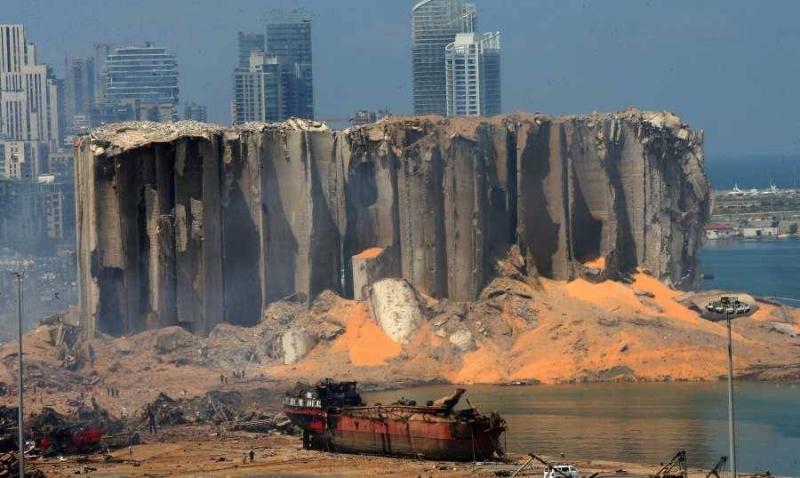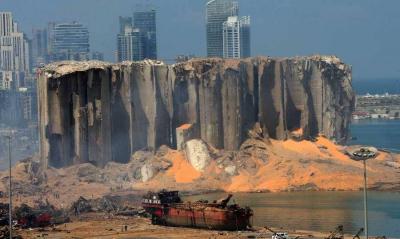A judicial source described the current state of the judiciary as "the worst in its history," stating that the economic, social, and health crises faced by judges and their families, along with political interventions in their work, have turned sensitive and critical judicial files into bargaining chips. The case of the Beirut port explosion is at the forefront of these files, with no prospect of the release or renewed independence for investigating judge Tarek Bitar.
The port case is receiving both internal and external attention. The informed judicial source revealed to "Asharq Al-Awsat" that "a delegation from the U.S. embassy visited the Palace of Justice in Beirut late last week, meeting with Deputy Public Prosecutor Imad Qabalan to learn about the reasons for the suspension of the investigation into this case." The source pointed out that the "U.S. interest is due to the fact that Mohammad Al-Ouf (the head of port security who has been detained in the case since August 6, 2020) holds U.S. citizenship." Qabalan explained to the delegation the legal obstacles preventing the resumption of the investigation, which stem from a case filed by MPs Ali Hassan Khalil and Ghazi Zeaiter against the president of the first chamber of the Court of Cassation, Judge Nagy Eid, who is assigned to consider the case challenging Judge Bitar's decision.
Qabalan elaborated that "the General Assembly of the Court of Cassation is incomplete and is waiting for the Minister of Finance to sign the decree for appointing the principal presidents of the cassation courts, which is held up by political wrangling." The difficult state of the judiciary is no different from other crumbling institutions; however, its negative repercussions are most impactful on the lives of Lebanese citizens. Former Deputy Public Prosecutor Hatem Madi believes that the justice institution "has become subject to political intimidation, coercing judges and submitting them to the wishes of those in power, whether by threatening to transfer them from their positions or by intimidating some of them by referring them to the disciplinary council and fabricating cases against them."
Madi pointed out in a statement to "Asharq Al-Awsat" that "there are judges who have been referred to the disciplinary council with cases meticulously prepared by security agencies under the influence of political and party powers." He stated, "They have humiliated and tamed the judiciary, making it a tool in their hands to implement political agendas or specific arrangements for the upcoming ruling."
The freezing of major and sensitive files has led to public doubt regarding the Lebanese judiciary's ability to investigate serious issues, reviving calls for international investigative committees, similar to what happened in the assassination case of former Prime Minister Rafik Hariri. Judge Madi asserts that "the problem is not the competence of the Lebanese judges and their qualifications, but rather the political authority that uses its influence to make files hostage to its will." He expresses sadness over "the suspension of the investigation into the Beirut port explosion, merely due to the indictment of some politicians."
To illustrate that all files are subject to bargaining, Madi emphasizes that "the ruling system will not allow the investigating judge (Judge Tarek Bitar) to resume his investigations and proceedings unless he stops pursuing ministers and MPs, which is the best evidence that politics currently overshadows judicial performance."
Sensitive files attract public attention, and observers believe they will remain pending until significant milestones are achieved, such as the formation of a new government, and possibly until after the term of President Michel Aoun ends and a new president is elected. This includes lawsuits against Central Bank Governor Riad Salameh and several banks, or the case of "Maktuf Exchange," and corruption cases that political protections hinder progress on.
The president of the "Justicia" rights organization, lawyer Dr. Paul Merhi, contends that "instead of subjecting politics to the rule of law, attempts are being made to subjugate the judiciary to the rule of politics, as central comprehensive legal action against corruption has not occurred, but rather sporadic, fragmented, and sometimes non-standard judicial movements have taken place."
All these practices reinforce the ruling authority's desire not to grant the judiciary its independence or allow it to combat corruption and recover people's money. Merhi tells "Asharq Al-Awsat," "We are futilely waiting for the political authority represented by the government and parliament to grant independence to the judiciary, as individuals within it have no interest in that; rather, their interest lies in continuing to intervene in the judiciary, security, and administration to secure their interests in these positions."
The president of the "Justicia" organization stressed that judicial independence "must stem from within the judiciary through courageous judges who emulate the Italian experience of 'clean hands' (Mani Pulite) and others." He urged judges to speed up "the signing and commitment to a code of conduct in which they pledge not to hold any political or administrative position in the Lebanese state if they occupy advanced judicial positions, thus bolstering their immunity against political temptations."




